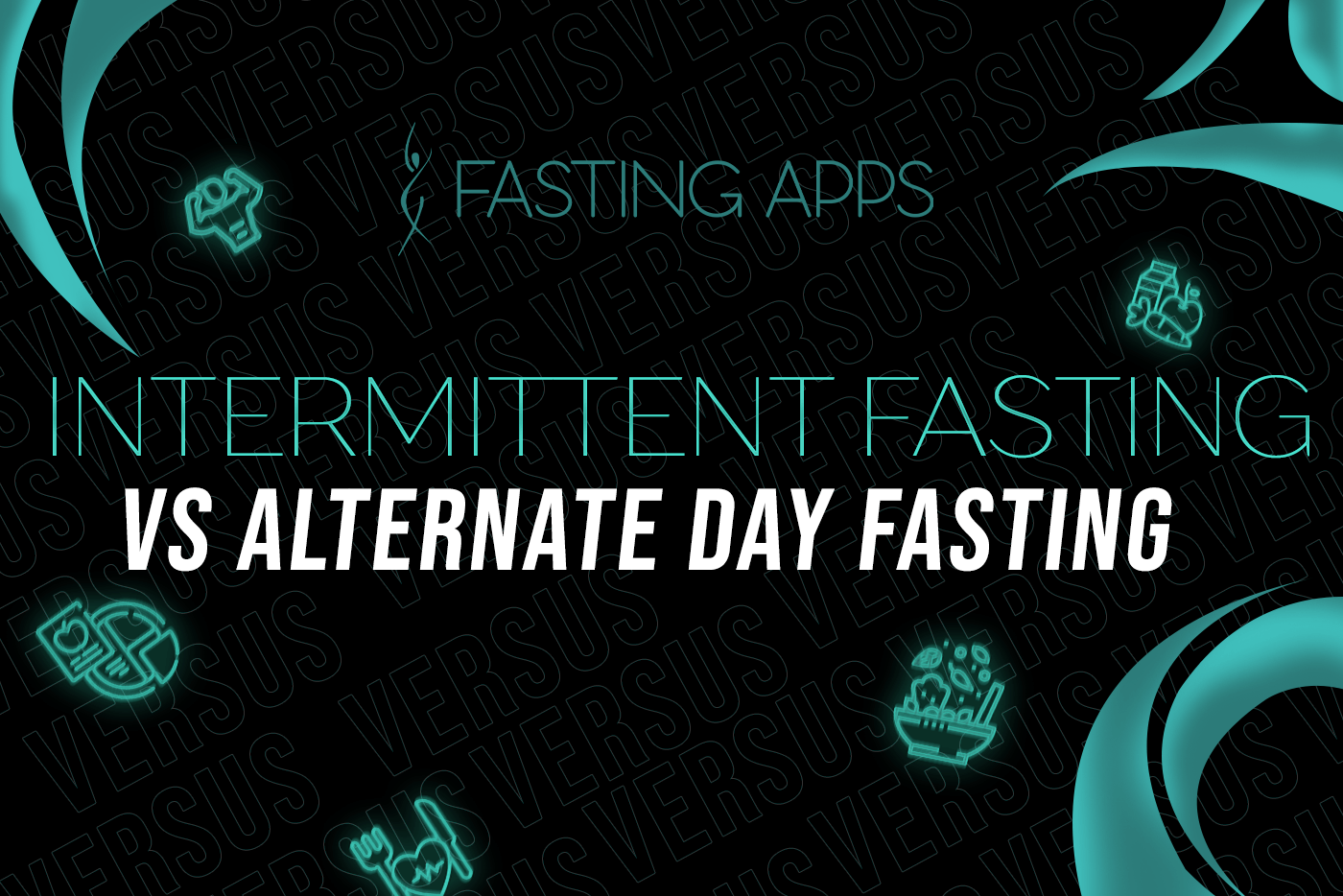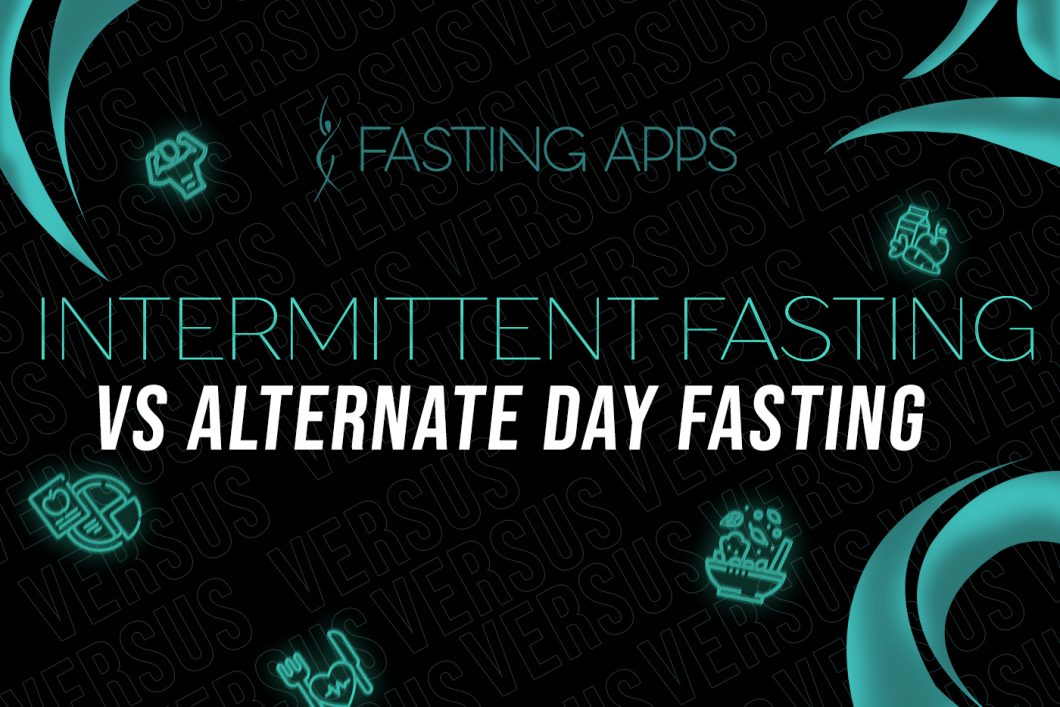Intermittent Fasting vs Alternate-day Fasting
Written by Andrew Brewer. ⚕️Reviewed and fact checked by our medical team.

Intermittent fasting is a type of diet and lifestyle change that helps you control when you eat rather than what you eat, and alternate-day fasting is an advanced type of it. You eat every other day, though you can be flexible if you need to eat a minimum amount of calories to get through the day, especially if you’re on medicine that requires food.
You get a lot of the same powerhouse benefits during these diets; however, the longer you fast, the more benefits you’ll see in both the long-term and the short-term. Let’s explore why so you can choose your plan.
Key Takeaways
Intermittent fasting and alternate-day fasting are two types of diets that involve controlling when you eat, rather than what you eat. Both have been linked to benefits such as weight loss, disease prevention, and improved sleep.
Alternate-day fasting is an advanced type of intermittent fasting, where you eat every other day, with some iterations allowing for 500 calories during fasting days. While it may offer some unique benefits, it may also be more challenging for some people to stick to.
The longer you fast, the more benefits you may see from these diets, including increased autophagy (a process in which the body recycles damaged cells) and more significant weight loss. However, it's important to choose a fasting plan that works for your lifestyle and to gradually work up to more advanced forms of fasting.
Benefits of Intermittent Fasting
Intermittent fasting is more than a diet. It’s a lifestyle that helps you limit your eating to certain times of the day or the week. One of the most popular intermittent fasting plans is 16/8, where you fast for 16 hours a day. This helps you get a lot of the great benefits of fasting while still eating every day. Weight loss, disease management and prevention, and improved sleep are just the beginning. Often, those who intermittent fast are able to successfully transition from medicine with just diet changes. It’s a powerful tool that can completely overhaul your life.
Benefits of Alternate-day Fasting
Alternate-day fasting is an advanced type of intermittent fasting. You’re more likely to be successful if you gradually increase your fasting windows because your body will have adapted over time. Alternate day fasting is when you eat every other day, though some iterations can include consuming 500 calories during fasts to help power through the day.
Alternate-day fasting can help improve your blood sugar levels, reduce your cholesterol, and promote heart health. You lose weight because of the calorie deficit during your fasting days, but you’ll still want to limit your eating windows to healthy, nutrient-rich foods for the best results.
What are the Differences?
Alternate-day fasting is a type of intermittent fasting, so there aren’t a lot of differences between the two. However, the benefits of fasting times will vary, so let’s explore why.
Weight Loss
Intermittent fasting and alternate-day fasting, and powerful weight loss tools; however, if you modify the plan to eat on your fasting days, then it will be no more effective at fostering weight loss than calorie restriction. For the best results, you want to avoid eating. If alternate day fasting is too challenging, adjust your eating window to something that works for you and your lifestyle. You will feel less restricted and set yourself up for success.
Modified Fasting
The most benefits of intermittent fasting come from when you don’t eat - your body starts to heal, triggering beneficial processes that play huge roles in disease prevention and management. Alternate-day fasting allows you to eat every other day; however, there is a popular modified plan that allows you to eat up to 500 calories during your fasting days. You can still get great benefits, including lowering cholesterol.
Autophagy
Autophagy is the most important side effect of intermittent fasting. It helps your body recycle cells, purging the dead, dying, and damaged cells and replacing them with healthy new cells. The longer you fast, the longer your body will be in autophagy. Eating anything - even some supplements - can break the process, so it’s important to maintain your fast. Modified alternate-day fasting will break autophagy, so keep that in mind.
How to Choose?
Because alternate-day fasting is a type of intermittent fasting, you don’t have to choose between the two to reap the most benefits! However, you do have to choose what fasting plan works for you and your lifestyle. If you’re considering alternate-day fasting, work up to it. Don’t just plunge in.
Our #1 Recommendation: DoFasting
It's easily one of the best intermittent fasting apps that offers plenty of features for anyone!
Use coupon code: 10app to get an extra 10% off all memberships.
FAQ
How do intermittent fasting and alternate-day fasting differ from each other?
Intermittent fasting involves cycles of fasting and eating within a specific time window, while alternate-day fasting involves alternating between fasting and eating every other day.
What are the benefits of intermittent fasting?
Intermittent fasting has been shown to have several benefits, including weight loss, improved metabolic health, and a reduced risk of chronic diseases.
What are the benefits of alternate-day fasting?
Alternate-day fasting has been shown to have similar benefits to intermittent fasting, including weight loss and improved metabolic health.
How does intermittent fasting affect weight loss?
Intermittent fasting can lead to weight loss by reducing calorie intake and increasing fat burning.
How does alternate-day fasting affect weight loss?
Alternate-day fasting can lead to weight loss by reducing calorie intake and increasing fat burning.
Is alternate-day fasting safe for everyone?
Alternate-day fasting may not be suitable for everyone, including pregnant or breastfeeding women, people with a history of eating disorders, and people taking certain medications.
What are the potential risks of intermittent fasting?
Potential risks of intermittent fasting include dehydration, fatigue, irritability, and difficulty concentrating.
What are the potential risks of alternate-day fasting?
Potential risks of alternate-day fasting include dehydration, fatigue, irritability, and difficulty concentrating.
How long should someone fast during intermittent fasting?
The length of the fasting period during intermittent fasting can vary, but common fasting periods include 16 hours and 24 hours.
How long should someone fast during alternate-day fasting?
During alternate-day fasting, a person would typically fast for 24 hours and then eat normally for 24 hours.
Can someone eat anything they want during the non-fasting periods of intermittent fasting?
While there are no specific rules about what to eat during non-fasting periods of intermittent fasting, it is generally recommended to focus on healthy, whole foods.
Can someone eat anything they want during the non-fasting periods of alternate-day fasting?
During non-fasting periods of alternate-day fasting, a person can eat whatever they want.
How should someone break their fast during intermittent fasting?
When breaking a fast during intermittent fasting, starting with a small meal that includes protein and healthy fats is recommended.
How should someone break their fast during alternate-day fasting?
When breaking a fast during alternate-day fasting, starting with a small meal that includes protein and healthy fats is recommended.
Which type of fasting is better for weight loss?
Both intermittent and alternate-day fasting can be effective for weight loss, but the best option depends on individual preferences and lifestyle factors.
Which type of fasting is better for overall health?
Both intermittent fasting and alternate-day fasting have been shown to have health benefits, but the best option depends on individual preferences and lifestyle factors.
Can intermittent fasting or alternate-day fasting help with chronic disease management?
Both intermittent fasting and alternate-day fasting have been shown to improve metabolic health and reduce the risk of chronic diseases such as diabetes and heart disease.

